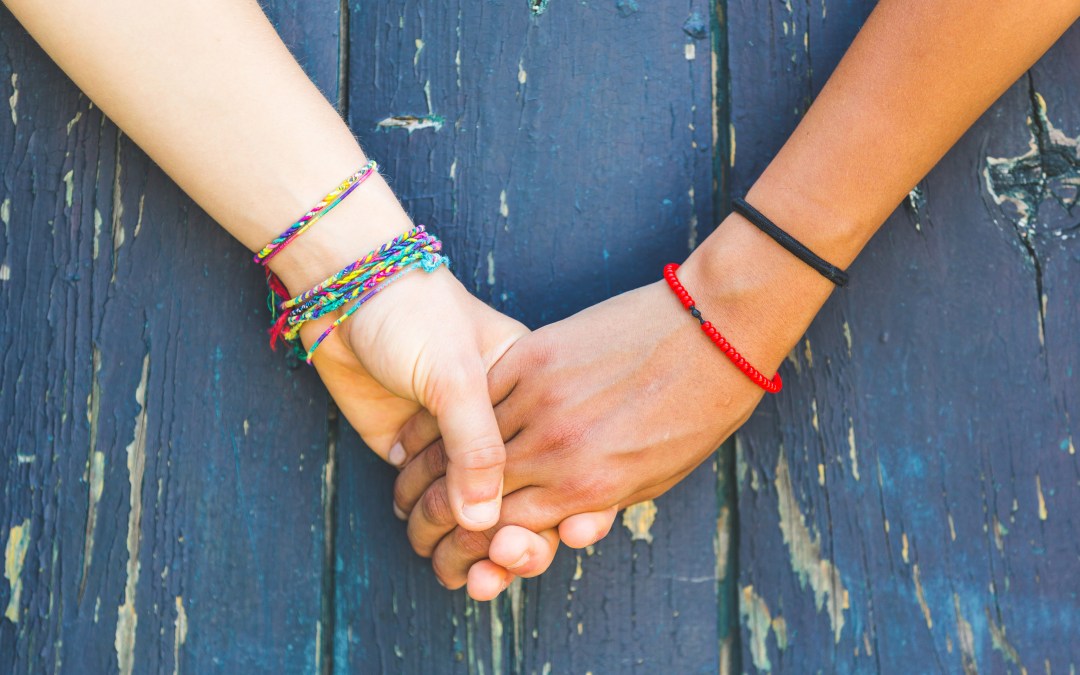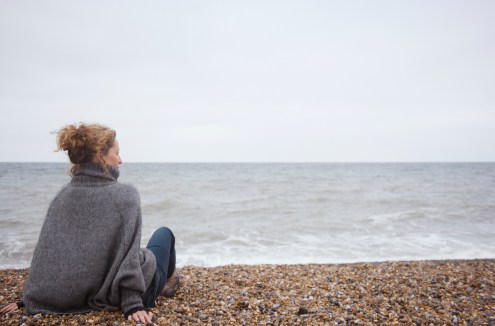LGBTQIA+ – would life be better without labels?
When Ellen Tout came out as a teenager, she found the word ‘lesbian’ restrictive. As the queer community moves away from compartmentalising, she asks, wouldn’t all our lives be better without labels?

5 minute read
Ten years ago, I went to my first Pride event. I had come out to only a few friends and still felt unsure about who I was or how I identified. I remember staring in amazement at the veritable rainbow of people and communities. It felt like a new world – one of freedom and self-expression where difference is embraced and the focus is on love.
Today, for me, Pride still embodies acceptance, inclusivity and fun. Last year, my girlfriend and I took part in the Pride in London parade. Walking down Oxford Street, we were met by cheers of positivity and love as people waved flags, ran up for hugs and celebrated our shared pride. It’s an experience I’ll never forget. I love that at Pride nobody is restricted by boxes or labels – there’s the fluidity and freedom to be whoever you want to be.
I’ve noticed these values being embraced more nowadays. I think the future is full of the possibility to create our own identity. As ideas and social norms evolve, we can all step out of our boxes and experiment with who we are – not just in terms of sexuality, but whatever labels we have, letting go of expectations around gender, family roles, job titles, education, class, interests and traits. This thinking is welcomed by young people. Research by the Office for National Statistics found that 4.2 per cent of 16- to 24-year-olds identify as lesbian, bisexual or gay. And YouGov reported that 49 per cent of 18- to 24-year-olds describe themselves as ‘not heterosexual’, shifting to a more open view. It’s progress from when I was at school and being called ‘gay’ was an insult!
Growing into me
It took me a while to realise I wasn’t straight. My friends were focused on boys and we never learned about same-sex relationships. I thought I was a late bloomer and would one day find the right boy. That changed when I moved to Birmingham as a student. Being away from home gave me the opportunity to discover who I was. Meeting new people and learning about myself, I began to examine other aspects of me as an individual.
I distinctly remember the moment that I realised I wasn’t straight. I was walking to my halls, thinking about a nice boy I’d met and wondering why I didn’t feel that way about him. Suddenly, something clicked and it all made sense. The first person I told was a gay friend called Rob. We went to gay-centred film nights, clubs and events together, and I learned about a new culture.
Gradually, I started talking to friends about my sexuality. Some were shocked, but supportive, and others simply weren’t bothered. At the time, I didn’t know about the spectrum of orientations. As far as I knew, you were gay or straight, and I definitely wasn’t straight – so I fell into calling myself a lesbian.
It took me months of worrying before I told my parents, but they couldn’t have been more supportive. Little did I know I’d be coming out most days of my life – at a new job, at the hairdresser, holding my partner’s hand, at the GP… and it always made me feel awkward (and still does). My sexuality is one of the least interesting things about me, but society places so much emphasis on defining it.
Sense of belonging
It felt good to be open but the label ‘lesbian’ felt laden with stereotypes and expectations – like I’d stepped from one box into another. I remember thinking that if I was going to fit the label, I had to dress, cut my hair and act a certain way. I was baffled after a conversation with a colleague: ‘No offence,’ he said, ‘but you don’t look like a lesbian.’
I often felt out of place with straight friends, who stopped including me in conversations about men. I also felt different from the lesbians I saw portrayed in the media or met in LGBTQIA+ groups. I have friends for whom it is important to name their sexuality but, for me, the word ‘lesbian’ felt rigid, describing someone I’m not. In Affinity Magazine, writer Zoe Jennings suggests this is because the word ‘lesbian’ is hypersexualised, particularly by men and the porn industry. I think this explains why part of me rejects it. I am happier with more encompassing words, such as ‘gay’ and ‘queer’, which also describe a community and identity.
Younger generations seem less interested in using old labels and more open to embracing inclusive words such as ‘queer’, and I hope this trickles into our popular language and culture. ‘Queer’ [a formerly derogative word, reclaimed as a positive] is an umbrella term that refers to sexuality and/or gender. To me, it means that I am a human being who loves other human beings and doesn’t want to be defined. ‘Queer’ is more inclusive of the trans and non-binary community, which is important to me. I like its freedom and ambiguity.
Hollow words
Moving away from labels gives us the opportunity to explore who we are as individuals. Gina Battye, a coach working in the LGBTQIA+ community, believes we are all affected by this. ‘Over the years, we accumulate labels: daughter, son, mother, father, gay, straight, trans, boy, girl, creative, unlucky, shy,’ she says. ‘Labels add another layer to a mask we can hide behind. Ditching labels and catching yourself when you use them to define someone else will not only improve your health, it’ll have an impact on your relationships, finance, career – all areas of your life.’
Rúna Magnúsdóttir and Nicholas Haines, authors of The Story Of Boxes (No More Boxes Movement, £9.36) say that while some labels can be helpful, others hold us back: ‘When we put someone into a box, we’ve crafted an artificial limitation for them and ourselves. We increase the potential to create isolation and division.’
By not labelling others, they believe we benefit our own wellbeing, too. ‘A heightened sense of awareness opens opportunities, gives you freedom, an inclusive world view, and people will love and value you more.’ I now try not to make assumptions about anyone I meet and let them tell me their own story in their own time.
Magnúsdóttir and Haines encourage us to rethink the labels we give ourselves, too: ‘I’m just a mum’, ‘I’m not creative’, I’m unfit’, ‘I’m quiet’, ‘I’m responsible’. ‘When you raise self-awareness, you build a world where you are accepted for who you are; where everyone has freedom to be themselves, unlimited by classifications that don’t serve us.’
Our undefined shared life
Doing this has boosted my selfconfidence. I feel I have explored who I am and what I stand for, and have become more fluid in other areas of my life. For example, I am more self-assured in my identity as a woman who is strong and independent, sometimes girly, sometimes androgynous, but definitely no longer interested in fitting a particular mould. The future is fluid and letting go of expectations affirms your identity and welcomes more creative and kinder ways of thinking. The Pride celebration is a beautiful example of this. It’s a day free of judgement, discrimination and restriction. The emphasis is on love, compassion, equality and connection. However you identify, those are values that we can all share – every day of our lives.
Fling open the box and jump out
Authors Rúna Magnúsdóttir and Nicholas Haines help us rip off our restrictive labels. Ask yourself:
- Am I living in a gender/sexuality/work/family/class/race/health/personality box? What led to me being boxed? Who put me in this box? Did I do it to myself or did someone else label me? How does my box serve me in life? How does my box, or boxes, serve others?
- How do my boxes harm or limit me or other people? Do they bring us happiness and joy?
- Is living in a box kind to me? Is putting someone else in a box compassionate towards them?
- What would my life be like, look like and feel like if I didn’t exist within a box? What would the world look like?
Stonewall is the UK’s LGBTQIA+ equality charity.
Image: Getty








